Autumn, 2010
Added on Tuesday 26 Oct 2010
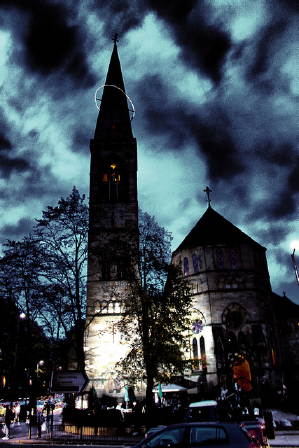 Of Plays and Pints
Of Plays and Pints
(photograph by Dave Trott)
What a brilliant success Oran Mor was able to celebrate this month by notching up its 200th Play, Pie and Pint production - a massive achievement for what was originally a low-key dramatic wheeze which might only have lasted a season or two.
It soon accelerated from its trial run to become nothing less than a main plank of the under-pressure but persistently vibrant theatrical circuit in Glasgow. Play, Pie and a Pint has become such a mainstay of West End life that it has evolved a special cultural identity all of its own - as in the anecdote I've been told about there being a sudden unexplained dearth of pies one day because (allegedly) a "Jack and Victor" element among the otherwise wonderful and admirable ranks of pensioners present were snaffling considerably more than their one-pie-per-person allocation.
The P,P and P season has always had a popular, but not necessarily populist, aspect to it, offering what regularly turns out to be top drama to audiences at least some of whom aren't otherwise regular theatregoers. The main honours have to go to artistic director David MacLennan, as familiar a face at Oran Mor as Alasdair Gray. In fact like Mr Gray he's a West End Icon, having made it into the elite band of Pat's West End Characters.
This month's celebration of the P,P and a P programme's bicentenary saw a series of mini plays crammed into the hour lunchtime slot, written by 40 different writers and with eight directors, all focusing on the central theme of Glasgow then and now.
Sponsored by Heineken, the Play, Pie & A Pint events have grown enormously in popularity since they began six years ago and, as a bonus for Oran Mor, have helped bring in trade during traditionally quiet times of the year. Heineken has been key sponsor for the last four years, having enjoyed a long standing relationship with Oran Mor licensee Colin Beattie for three decades.
The events run every Monday to Saturday lunchtime with a new play performed every week for 30 weeks of the year. The venue is now gearing up for its Christmas panto, Sleeping Beauty, which runs from November 29 until December 28.
Colin Beattie says he's delighted with the way things have turned out - the arts credentials of the venue were always intended to fulfil a big, bold, and continually-evolving ambition - and adds that Heineken's support has been pivotal to the idea's success.
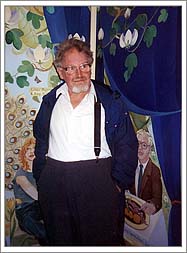 Still on the subject of Oran Mor - where author-artist Alasdair Gray is of course the Michelangelo-in-residence - I was greatly cheered this week to hear a radio encounter between Alasdair and that odious, fanatically pro-English telly historian David Starkey.
Still on the subject of Oran Mor - where author-artist Alasdair Gray is of course the Michelangelo-in-residence - I was greatly cheered this week to hear a radio encounter between Alasdair and that odious, fanatically pro-English telly historian David Starkey.
Starkey blathered away with his usual strident chauvinist fantasies, but once he'd crossed swords with Gray once or twice became suddenly far more cautious than his normally bombastic, gratuitously insulting self.
One of the nicer exchanges was when Starkey asserted that Glasgow was "provincial", upon which Gray replied that "this was a decision we have made - I think it's a decision London has still to make".
The Delphic menace contained within this simple statement threw the Anglocentric Ox-bore into complete fluster, and he was in bewildered gabbling mode by the time Alastair - pleasant, cheerful, brief and undemonstrative - had finished wiping the floor with him.
But what has all this to do with pubs, drinking and dining? Alasdair Gray is perhaps the leading Scottish exemplar of the concept of bringing together social and artistic culture in an accessible and non-elitist way; the parallel Play, Pie and Pint initiative is another classic example of this attitude.
In the 1930's and 50's Scotland's great literary and artistic minds (we had some, honest) gathered in pubs like Milne's Bar or The Abbotsford in Edinburgh, and The Curlers in Glasgow - or any of a dozen Glasgow Art School haunts.
From the 70's that mantle was assumed by the Ubiquitous Chip, where Ronnie Clydesdale was - for example - an active player in the anti-apartheid movement.
These days, when so many once good-going pubs have been poshed-up, closed down or turned into "licensed hairdressers" the natural home of all things arty and "social" is Oran Mor along with, of course, iconic saloons such as The Scotia Bar.
Can you imagine anyone getting into a literary lather in some ghastly coffee shop franchise, or some shushy wee trendy-wendy boutique lounge?
Hopefully the success of A Play, Pie and a Pint; and the art of Alasdair Gray (and other kenspeckle Scottish artists) will make Oran Mor a still more vital cornerstone of Scottish creative endeavour as we head into the bleak and challenging twilight of savage cutbacks and mass unemployment.
It's in such times that our "poets" must come to the fore - and it's all due credit to Colin Beattie and people like him for giving them the essential platform for their work.
Cafe Carnage
Meanwhile life is far from a cabaret for hard-pressed cafe owners on the mean streets around Byres Road, where Morton's Cafe - a place I thought would last for decades - has been the latest to turn up its toes.
Encouragingly, however, Cup (on the site of perhaps half a dozen failed ventures) has struck such a chord with its contemporary Miss Marple set that more ventures are planned for areas including Newton Mearns and Bridge of Allan.
With a customer profile that's 90 per cent female and an offer based around tea and cakes you'd wonder such an operation could find its market in notoriously rates-expensive Byres Road - but it has.
My favourite Byres Road area cafe at the moment is "Absolutely 161", directly opposite Peckham's, which brings an individualistic flourish to cafe staples such as paninis or toasties and serves excellent coffee.
This sort of place is a world away from the overpriced and anaemic high street chain coffee shops, at every level - particularly staff service - and deserves to thrive.
Stravaigin Again
I haven't been in yet, but it's good to see that after all those months of hammering, banging and sawing the "new" Stravaigin is very much back in business as the same sort of place it was before - but more so.
Despite all its success in food awards and its reputation as a nice civilised place to hang out the venture used to have all sorts of problems with city council jobsworths who became ultra-precious if it appeared somebody was daring to have a drink on the premises without also ordering a full sit-down meal.
Thankfully this nonsense has been dispensed with under the new licensing system, which while flaky and over-complicated has at least done away with self-contained olde worlde concepts like "pubs" and "restaurants".
One side of the new Stravaigin, with its king size picture window, is clearly primarily a bar, and was doing good business when I passed the other day. Initial impressions are that the decor and design are well up to the previous "eclectic" spec, creating what amounts to a new and improved version of the original. Stravaigin Max, really.
It slots nicely together with the different but complementary style of The Left Bank, and goes some way towards bringing a bit of cultured life back to a stretch which - if you except the Persian and Lebanese restaurants - seemed at risk of being overwhelmed with takeaway chains, Gregg's, etc.
If some use could ever be found for the seemingly permanently-dud restaurant site at the top of the road, on Bank Street where the Green Gate restaurant launched the local Indian restaurant scene in the 60's, the Gibson Street licensed trade circuit would be even more vibrant.
Equally vacant is the boarded-up former Bar Bola in Bank Street ... a mute monument to the dead concept of the "style bar" which, to be fair, had outlived its natural shelf life by several years.
Curiously, Bar Bola as was had previously been The Blythswood Cottage, with a 60's decor scheme - all mock Tudor plastic beams and dark wood - exactly the same as that of nearby Doublet Bar (also Allison's Bar on the south side, and perhaps others).
The Doublet, mercifully, continues much as it has done since 1964, Tudor beams and all.
The Mawn the Merrier
A few weeks ago I wrote a blistering rebuke in The Publican to Glasgow cooncillors and other politicians who seem to be getting set to apply a licence freeze to the West End, on the specious and unsupported grounds that there are "too many already" and that pubs encourage binge drinking and late night disorder.
This blinkered argument fails to see that good new outlets actually improve an area, and that by preserving the mediocre and the downright poor - while allowing no new ventures in - you doing absolutely nothing to address the source of the problem ... which is the supermarket.
It is in supermarkets that people determined to get drunk of an evening purchase their rocket fuel of choice, and it's the pubs which then have to field the merry "revellers" as they stoat into premises (in garb that would disgrace a Halloween Night in Faliraki) in search of a top-up.
Admittedly the late week and weekend scene in one particular area of the West End - around the middle of Byres Road - is pretty tacky and boisterous, but in areas as diverse as Woodlands Road and Partick Cross you'll find places happily trading till midnight without causing any bother whatsoever.
The persistent myth (put about by people who never visit the places they criticise) is that a licence is a bad thing, per se. This simply could not be farther from the truth, because - as with Stravaigin, or The Left Bank (or The Blind Pig) - it's the carefully thought-out bar or bar-restaurant that lends the area a hefty portion of the "character" which makes it so popular in the first place.
If you want small-c conservatism and suburban boredom move to Cathcart, which if it weren't enlivened by a sprinkling of quality pub oases would be almost literally dead, bereft of life. We don't need "less" licences, but more "good" licences - and it seems to be what many local residents want too.
This is just a lengthy preamble to my warm welcome for the latest in the series of splendid licensed trade ventures launched by well-known local operator Allan Mawn in Thornwood.
To Pinxto Basque restaurant and cafe-bar Velvet Elvis we can now add art deco Italo-Scottish tribute venue The Criterion - whose name stands out in massive "Maigret" style script on its subtle "jaune" backing (Allan tells me he didn't want a big statement on a loud "Partick Thistle Yellow" backing).
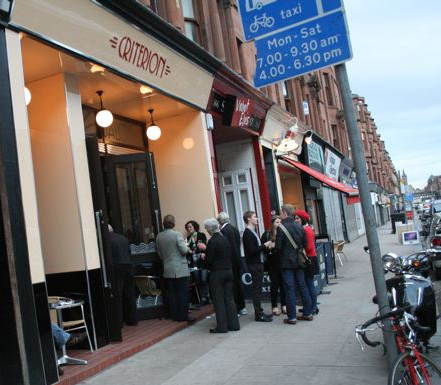 I enjoyed meeting him just after it opened, and he took Pat Byrne and I through the whole story of what he was aiming to do there over a leisurely lunch - while across the way journalist Anna Burnside, a friend of his, was hosting a table of Yummy Mummies and their progeny - one of whom made a bold crawl for freedom but was promptly arrested by a vigilant mum.
I enjoyed meeting him just after it opened, and he took Pat Byrne and I through the whole story of what he was aiming to do there over a leisurely lunch - while across the way journalist Anna Burnside, a friend of his, was hosting a table of Yummy Mummies and their progeny - one of whom made a bold crawl for freedom but was promptly arrested by a vigilant mum.
The decor is classy but not starchy, and while "in keeping" with the same apparently haphazard but in fact intensely planned setting of Velvet Elvis is the sum of a hundred touches large and small.
Very recently I returned to Criterion for a chat over coffee with the managing director of the firm bringing Scotland's flagship Waitrose store to Newton Mearns - definitely somebody with a keen eye for a quality site - and he marvelled to discover the place was actually split new, and not an ancient cafe which had been given the Islington treatment.
Possibly the best compliment I can pay the appearance of Criterion is to say that if you didn't know the area's immediate past history you'd have no difficulty believing this was a venerable bistro given a sympathetic contemporary spruce-up.
Even more recently I joined a party of seven journalists for a night out at Criterion - they'd fancied somewhere "West" and, this place being new, it seemed an obvious choice.
The food got a more or less unqualified rave ("best Carbonara I've had outside Venice" being one of the more fulsome), with everyone eating Italian except me. I had one of the daily specials, pork with sweet potatoes in an orange sauce - and it was first class; a wee bit different without trying to be too "clever" or "challenging".
It was my first outing since recovering from a nasty seasonal bug, and couldn't have come a moment too soon. The group I was with also commented very favourably on the "value" the place offered for the prices charged - and they were absolutely right. It isn't dear at all.
However it's important to stress that while you don't need a degree in English Lit to enjoy yourself at any of Allan Mawn's three adjacent outlets it might just help.
Press blurb for the new venture makes free with terms like "fin de siecle" (which precedes Art Deco by a few decades) and the most recent article - in the Herald magazine - ran amuck with arcane terms, including tryptych (typically an art work in which a larger central work is hinged with flanking, related smaller works; ie, all in a single theme); and, my favourite, "triumvirate".
This, as all fans of the history of the Roman Late Republic will know, is a group of three men (it's always men), who control a political system ... for example Caesar, Pompey and Crassus. Not three bar-restaurants. Although you could argue that collectively the three outlets have a triumviral hold over the local licensed trade scene.
Joanna Blythman was fairly complimentary in her review, but seemed disappointed the menu selection wasn't a bit more racy. I disagree. There's plenty going on in the daily specials, and most customers do not want to be amazed by extravagant "ouvres" - just given nice food.
The ethos of "Keep Partick Weird" promoted by Allan - weird in the sense of "a bit local, a bit different" - doesn't sit well with the world of gastro-maestros and Michelin stars. This, it seems to me, is about giving normal people with good taste food they'll actually enjoy.
Another columnist, perhaps carried away by the grandeur of modern Thornwood, called The Criterion "The Colosseum" by mistake, but of course good-naturedly corrected this in next issue and thereby gave the place a double shout. How could you possibly confuse these two words, criterion and Colosseum? It could be the writer was subconsciously thinking not of the notorious amphitheatre of death sports in ancient Rome but the old Coliseum in Bridge Street, which used to be a Superama cinema showing movie epics (like Ben Hur) on three full-size screens joined together - a cinematic tryptych.
It was in turn housed in a building of classic architectual merit, which has never been properly recognised - so there is in fact a nice wee compliment to Criterion just possibly concealed within an otherwise merely amusing slip. The night I went there with the journos was a briliant advertisement for the licensed trade at its best. Pinxto was all soft lighting and muted conversation, and Velvet Elvis was noticeably busy with what seemed a youngish (under 40!) sophisticated sort of crowd.
Most impressive for me at Criterion, even more than the nice decor and wholesome food, was the staff service. This was both punctilious but relaxed and friendly - a difficult art to master in a busy venue on a Friday night.
So should the city licensing authority be allowed to slap a ban on new licences in the West End and perhaps put paid to any hope of similar ventures being developed in the future? Of course not - you only have to visit any of these three places in Thornwood and it's obvious this would be insane.
If it looks like it's ever going to happen I'll be among the first to help organise the petition to force a rethink. I might even form a triumvirate.
Down at The Den
Meanwhile a restaurant I never tire of visiting has earned another well-merited rave from a reviewer.
The Den at Dining In at Mother India (a big name for quite a small restaurant) won high praise from Ron McKenna in The Herald, once we got past his usual first few paragraphs of acute paranoia ... he was with a man dining companion, and Ron was doing all the ordering so maybe they thought he was gay, he feared; possibly a little irrationally.
Not that he's homophobic but you wouldn't want anyone to get the wrong idea, he seemed to be saying. Chill out!
Then he bridles because - very reasonably - one of the staff asks him if he's aware "that's rather a lot of food" as he notches up several starters, main courses and sides.
This is where I warm to this particular review, though, because with the paranoia forgotten and the dishes arrayed in front of him Ron and his fellow diner just pack away the grub like a couple of ploughmen after a hard day in the fields, and scoff the lot - radish paratha and all. He has one minor cavil with a novelty dish involving cashew nuts, but otherwise loves every morsel.
I can empathise with this bit, because earlier in the year I visited sister restaurant Mother India in Edinburgh and had an attack of what can only be called gluttony.
I persuaded myself that these tapas-style dishes (as I thought) would be wee "you'll have had your tea" lite bites, and that I wouldn't later feel like I'd just had a family size Christmas dinner. Which I did.
Not only did I probably order too many dishes, I was completely unable to leave any of them unfinished.
During recent trips to The Den (bearing all this in mind) I've found the main challenge is deciding what not to eat. One way of getting round it is to order some unadvertised (but definitely available) fish pakora to take away in a paper bag for "later". "Fabulous" is too lame a word for it.
My only fear for the Den is that its reputation will be become so great that it becomes difficult to get a table. In fact I don't think they should let you in unless you've a West End council tax certificate - but I doubt the management would agree.
Welcome to Shahrzad
This is is the latest incarnation of the restaurant that was once Trattoria Trevi near Kelvinbridge (diagonally opposite Cooper's pub on Great Western Road), and the latest in an exciting trio of Persian ventures on Great Western Road.
My brief experience of the cuisine (lunch, when they were trying out the menu earlier this year) tells me this is going to be "the new Indian" for some people, at least some of the time, and that "Persian" will very shortly be as standard a going-out option as Italian or Chinese. Named after the lady we tend to call Sheherezade (which apparently is the Arabic pronunciation) - who told the Caliph fantastic stories for 1,001 nights in order to avoid being terminated with extreme prejudice - the restaurant represents a culinary culture, rich and subtle, which has taken far too long to come to Glasgow.
One particular strength of this venture seems to be its understanding of how various wines can be combined sympathetically with the cuisine - which, unlike nearly all Indian food, really does benefit from the contrasting flavours of a nice wine - and at very reasonable prices the house wine (for example a Sicilian white) is good..
This is a world away from the old approach to wine in "ethnic" restaurants where people were asked to pay top dollar for bizarre tertiary products or mass factory brands.
More on this very interesting and welcome arrival to Kelvinbridge another time.
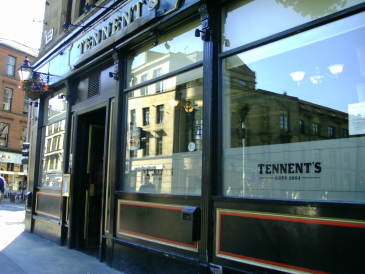 Tennent's Saved!
Tennent's Saved!
Or is it? As previously advertised, Tennent's Bar in Byres Road is to shut for a couple of months from January to be transformed into a radically different new format, and this has greatly concerned some of its regulars - who darkly fear it is about to become (shudder) "a cafe bar".
I can exclusively reveal, to anyone who doesn't know already, that in fact this is not true. It is certainly going to remain very much a pub.
However - and here's the bit some of its fondest habitues won't like - "It's a pub, Jim, but not as we know it." In fact Tennent's is one of several pubs across Scotland being converted to its Nicholson's pub brand, which makes great play of classic Victorian-Edwardian pub imagery - handpumps, big solid bar, classic gantry - to underpin solid big boozers like Tennent's which have typically been doing business for the best part of a century or more.
Sounds good, and it probably is too, but not everyone will appreciate the change. It will now be a food-led pub where the price of a typical meal will be exactly the same as in a high street restaurant, and where the quality of the food will aim to match high expectations - sorry, no more value-for-money caterpack pub grub.
Owner Mitchells and Butlers is not interested in selling cheap beer or food, and is quitting the price-sensitive market. It's a business strategy which for various perfectly sound reasons will probably be successful.
But outrage has been generated, and a Save Tennent's campaign, complete with online petition and a spontaneous bar-room revolution, is fully underway ... sadly for these regulars, I fear, to no avail. The future is Nicholson's. The Horse Shoe Bar in town - whose essential features will be preserved with great care, we're told - is also to become a Nicholson's pub.
Where all the price-insensitive folk are to appear from in these dark days of recession is a minor mystery, but while a lot of people have assured me "it'll never work", I'm pretty sure that it will.
There will be a lot of structural alteration inside Tennent's to create a big full-monty kitchen downstairs, and customers will be able to choose from everything from posh versions of classic pub favourites to (according to the Nicholson's website) a full Scottish menu, cullen skink and all.
Come February the venerable bar - once decked with sombre framed regimental insignia, now a jolly mish-mash of warehouse art and football screens - will reopen with what I suspect will be a bit of a flourish.
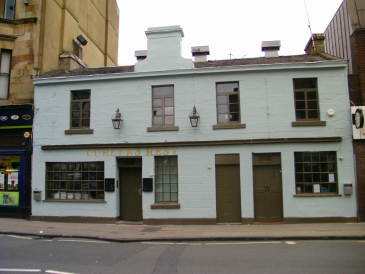 Some folk, though, won't like it, or may decide they simply cannot afford it, and will leave. Where to, though? That's the mystery.
Some folk, though, won't like it, or may decide they simply cannot afford it, and will leave. Where to, though? That's the mystery.
Meanwhile The Curlers"Rest" appears to be slowly gaining its crowd, although none of the reports (about four or five) I've had about the food are encouraging.
I think people are having difficulty with a price range that says "upper mid-market restaurant" in what they assume is "a pub".
Its menu has plenty of classics as well as more "global" choices, with hearty fare like Cumberland sausages, but the whole atmos of the place is avowedly "aspirational" - it has a wine list that actually resembles a wine list, something I understand Tennent's (owned by the same firm) will emulate.
It's civilised, expensive, does a truly superb range of drinks (from carefully chosen bottled beers to premium lagers and some well-selected cask ales) and probably deserves to prosper - but it's also the latest example of a pub that's really a restaurant that's really a wine bar, and a fairly dear one for its tin pan alley milieu.
Which takes us back to the concept of the "real pub", which is increasingly (and, despite all my usual bluster, often deservedly), becoming an endangered species.
There are still a few about, of which the absolute best include The Ben Nevis, the Lismore and - newly triumphant - The Three Judges at Partick Cross. Over Woodlands way it's Uisge Beatha and, of course, the immortal Doublet. The Judges, as I've said before, is festooned with awards from the licensed trade and CAMRA garnered over many years, and its greatest ever claim to fame was winning third place in the cask ale category for the awards run by The Publican - something no other Scottish pub has managed.
So you might assume the staff would be blase about picking up the cider bar of the year title from one of the Scottish licensed trade award competitions this month, but in fact nothing could be farther from the truth.
On the contrary it's yet another rousing endorsement of the fact that this really rather small and superficially ordinary pub is doing something a bit special and clever - which is to be a "real local pub" on the one level but at the same time offer an extraordinary service. I have yet to find any pub which has a better range of beers, and to that we can now add "cask cider". Personally I hate the stuff, but I'm all in favour of maximum choice when it comes to quality products, so long as the cellar management (consistently excellent, in this case) is up to the job.
Congratulations are also due to The Clockwork Beer Company, south of the river, which like the Judges is run by Maclay. It won the best beer quality award in the same contest, amply confirming what its regulars have known for years.
Pelican Crossing
To my chagrin because of work I missed the opening of this most talked-about restaurant opposite Kelvingrove, but I don't think I've ever had such a stream of positive reports about a venture - which bodes very well for its future. I aim to try it in detail as soon as possible, if I can struggle past the nearby Mother India Den.
Meanwhile I won't now get a chance to say anything about the Queen of Sheba, the African restaurant near Charing Cross, as despite one very enthusiastic review and the late arrival of alcohol on the premises it didn't find its market quickly enough in what is a far from ideal trading location.
This, I'm sad to say, means that apart from some wonderful North African cuisine in the West End for actual sub-Saharan African food you now have to go all the way to the south side ... but it may be worth the trip.
Mr Singh's Pie
Ending where we started this column - with a pie - one man who has formed a sort of triumvirate, at least of the pie world, is restaurateur Satty Singh, owner of Mr Singh's India on west end Sauchiehall Street.
Along with McGhee's Bakery and Pars Foods he has invented a new pie - to wit, a Curry Pie.
It has been trialled at Scottish football grounds, where plain mutton pies or beefy Killie pies are usually de rigeur, and sold 10,000 (like hot pies, in fact) in the first two months of the season.
To get the concept off to a flyer Satty asked some of his pals round to his West End restaurant for a bite - these being about half a dozen or more of the most iconic names in Scottish football legend, for example Kenny Dalglish, and they cheerfully endorsed the pie, with its chicken Ambala filling.
Distribution on the mass market - through quality supermarkets and delis, no doubt - seems assured. It's a Waitrose sort of a pie, but at a price well within the reach of the ordinary consumer.
In the interests of research, I've tried one. It's great. The pastry is light and lustrous, nothing like the slab of stodge of "ordinary" pies, and the filling is a real restaurant quality Indian curry, which is something I don't think has ever been achieved before.
I'm with Kenny and the lads all the way on this one. This is a pie whose time has come.
Roy Beers Glasgow West End Dining and Drinking Summer 2010 archive







